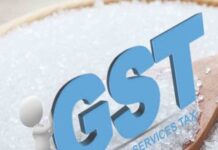The 56th meeting of the Goods and Services Tax (GST) Council took place in New Delhi, chaired by Union Finance and Corporate Affairs Minister Nirmala Sitharaman. During the session, the Council made several key recommendations, including revisions in GST tax rates. These proposed changes aim to provide relief to individuals, the general public, and the aspirational middle class, while also introducing measures intended to ease and promote trade under the GST framework.
FM Nirmala Sitharaman on Wednesday announced consolidation of 12% and 18% slabs into a dual rate structure of 5% and 18% besides 40% for sin goods.
The GST Council increased the GST on all goods [including aerated waters], containing added sugar or other sweetening matter or flavoured. The tax rate has been revised from 28% to 40%.
GST rates on refined sugar containing added flavouring or colouring matter, sugar cubes (other than those which attract 5% or nil GST), sugar boiled confectionery has been slashed from 12% to 5%.
GST rates on other sugars, including chemically pure lactose, maltose, glucose and fructose, in solid form; sugar syrups not containing added flavouring or colouring matter; artificial honey, whether or not mixed with natural honey; caramel, sugar confectionery has been slashed from 18% to 5%.
GST rates on jams, fruit jellies, marmalades, fruit or nut purée and fruit or nut pastes, obtained by cooking, whether or not containing added sugar or other sweetening matter revised from 12% to 5%.
GST rates on all goods (including aerated waters), containing added sugar or other sweetening matter or flavoured, caffeinated beverages, carbonated beverages of fruit drink or carbonated beverages with fruit juice has been increased from 28% to 40%.
—
18% to 5% slabs
Sugar confectionery – [other than mishri, batasha, bura, sakar, khadi sakar, harda, sakariya, gatta, kuliya, elaichidana, lukumdana, chikkis like puffed rice chikki, peanut chikki, sesame chikki, til chikki, til patti, til revdi, sugar makhana, groundnut sweets, gajak and sugar boiled confectionery].
—-
“In common man and middle class items, there is a complete reduction. This reform is not just about rationalising rates. It’s also on structural reforms. It’s also about ease of living, so that businesses can conduct their operations with the GST with great ease. We’ve reduced the slabs. There shall be only two slabs, and we are also addressing the issues of compensation cess,” Sitharaman said at a late evening press conference.
“These reforms have been carried out with a focus on the common man. Every tax on the common man’s daily use items has undergone a rigorous review, and in most cases, the rates have come down drastically. Labour-intensive industries have been given good support. Farmers and the agriculture sector, as well as the health sector, will benefit,” Sitharaman said.
“We have corrected inverted duty structure problems, we’ve resolved classification-related issues, and we’ve ensured that there will be stability and predictability about the GST. We’ve reduced the slabs. There shall be only two slabs, and we are also addressing the issues of compensation, ease of living, simplifying registration, return filing and refunds,” she added.
Other items on which GST has been reduced to 5% include hair oil, toilet soap, soap bars, shampoos, toothbrushes, toothpaste, bicycles, tableware, kitchenware, and other household articles.
Items on which GST has been reduced to zero from 5% include ultra-high temperature milk, chena and paneer. All Indian breads will be available at a nil rate. So roti or paratha or whatever it is, they all come to nil.
There is a reduction of GST from 12% or from 18 % to 5% on food items- namkeen, bujjiya, sauces, pasta, instant noodles, chocolates, coffee, preserved meat, cornflakes, butter, and ghee. All these will be in 5% category.
She announced reduction from 28 % to 18% on air conditioning machines, dishwashing machines, small cars. Motorcycles equal to or less than 350 cc are all now coming to 18%.
In his Independence Day address, Prime Minister Narendra Modi had said that next-generation GST reforms by Diwali will reduce taxes on daily essentials, benefiting MSMEs, local vendors, and consumers, while simultaneously stimulating economic growth and creating a more efficient, citizen-friendly economy















